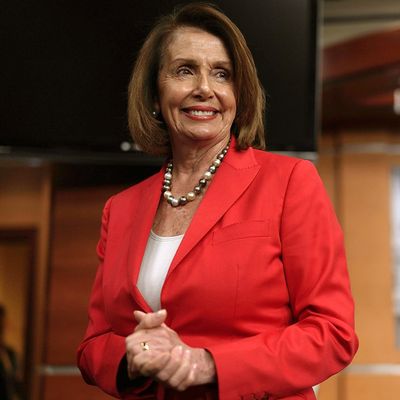
Late last week, the Republican Party came down with a bad health issue: In defiance of long-standing norms, settled law, and its own political interests, the Trump administration pledged its support to a lawsuit contending that Obamacare’s protections for people with preexisting conditions are unconstitutional.
Specifically, the Justice Department announced that it would not defend the Affordable Care Act from a challenge brought by a group of red states, which claims that Congress’s repeal of the individual mandate renders the rest of the law unconstitutional — as that provision is not severable from the rest. This is a legal claim so radical and ill-supported it made the National Review blush. The notion that Congress is not constitutionally allowed to eliminate the ACA’s insurance mandate — unless it also repeals the law’s other regulations of the health-care market — is not some sacred principle of constitutional originalists. Rather, it’s a transparently ad hoc rationalization for the judiciary to veto a duly-passed expansion of the safety net. And yet, Attorney General Jeff Sessions concluded that his department could make no honest argument against the plaintiffs’ case.
Publically, the administration’s decision provoked more outrage from Democratic officeholders than Republican ones; but in private, the opposite dynamic likely prevails. Few things would be worse for the GOP’s political health than a renewed debate over Obamacare repeal — let alone, one over whether insurance companies should be allowed to deny coverage to working-class cancer patients.
The GOP’s initial support for letting the market decide who can get chemotherapy without having to declare bankruptcy proved so toxic, congressional Republicans retained versions of the Affordable Care Act’s protections for people with preexisting conditions in all of their health-care bills last year. But keeping Obamacare’s most popular regulation in place wasn’t enough to salvage the repeal effort. In fact, the American Health Care Act ended up being the most unpopular piece of major legislation in our nation’s modern history. Shortly after the bill’s introduction last spring, the Democratic Party opened a double-digit lead in polls of the 2018 generic ballot, while President Trump’s job approval dipped. Subsequent surveys showed the public favoring the Democrats over the Republicans on health-care policy by wide margins.
And it isn’t hard to see why. Out-of-pocket health-care costs are rising for virtually everyone in the United States. Drug prices are resolutely high, premiums on the individual market are skyrocketing (thanks to the GOP’s tireless efforts to sabotage said market), and the average deductible for those with employer-provided insurance has increased by nearly 400 percent since 2006. The Democratic Party’s prescription is for the government to impose price controls, while further subsidizing ordinary Americans’ health-care costs by raising taxes on the rich (the party is internally divided over the details of its policy, but united on its general direction). The Republican Party, by contrast, is beholden to reactionary interests who want the government to cut public spending on health care, so as to finance ever-lower taxes on the wealthy and corporations.
And virtually no one (who hasn’t attended a Koch Network fundraiser) favors the GOP side of this argument. Most of the Republican base actually opposes tax cuts for the rich and corporations, supports increased federal spending on health care, and believes that the Medicaid expansion should be preserved.
So long as Republicans did not have to put forward an alternative, they could advance their fanatical donors’ crusade against the welfare state — while simultaneously exploiting popular dissatisfaction with the American health-care system, by using “Obamacare” as synonym for everything the public resented about the latter. But once the party came into power — and tried to increase the ranks of the uninsured by 20 million, while gutting coverage for the poor and cutting subsidies for the working class — the irreconcilable desires of its top investors and the American public became clear; and the health-care issue became politically toxic for Republicans.
For this reason, Republican candidates have largely sought to avoid the topic. And Mitch McConnell has worked to prevent any Senate action on health care this summer, in defiance of Chuck Schumer’s wishes. But the well-heeled reactionaries who underwrite McConnell’s power haven’t gone anywhere. And they aren’t ready to take the unpopularity of their goals as an excuse for the GOP’s failure to realize them. Thus, some conservatives in both chambers are calling on their party to revive the Obamacare fight, while right-wing attorneys general force the issue in the courts — and the Trump administration cheers them both on.
And Democratic consultants are cheering with it. The party’s No. 1 strategic objective has been to force health care to the front of voters’ minds — both to exploit the party’s advantage on that issue, and to undermine public support for the Trump tax cuts by reminding voters that the GOP always intended to pay for its regressive giveaway with cuts to Medicaid and Obamacare.
Last month, Republican congressman – and longtime GOP strategist — Tom Cole told CNN that health care wouldn’t be “salient” in the midterm campaign. “It’s hard to beat you on a vote you didn’t succeed on,” Cole reasoned. “The ACA wasn’t repealed, and the only part of it that was was the least popular part: the individual mandate.”
Now, the White House is arguing that, as far as the constitution is concerned, the ACA was repealed. Democrats may object to that idea in courts of law — but they’re more than happy to promote it in the court of public opinion.






























